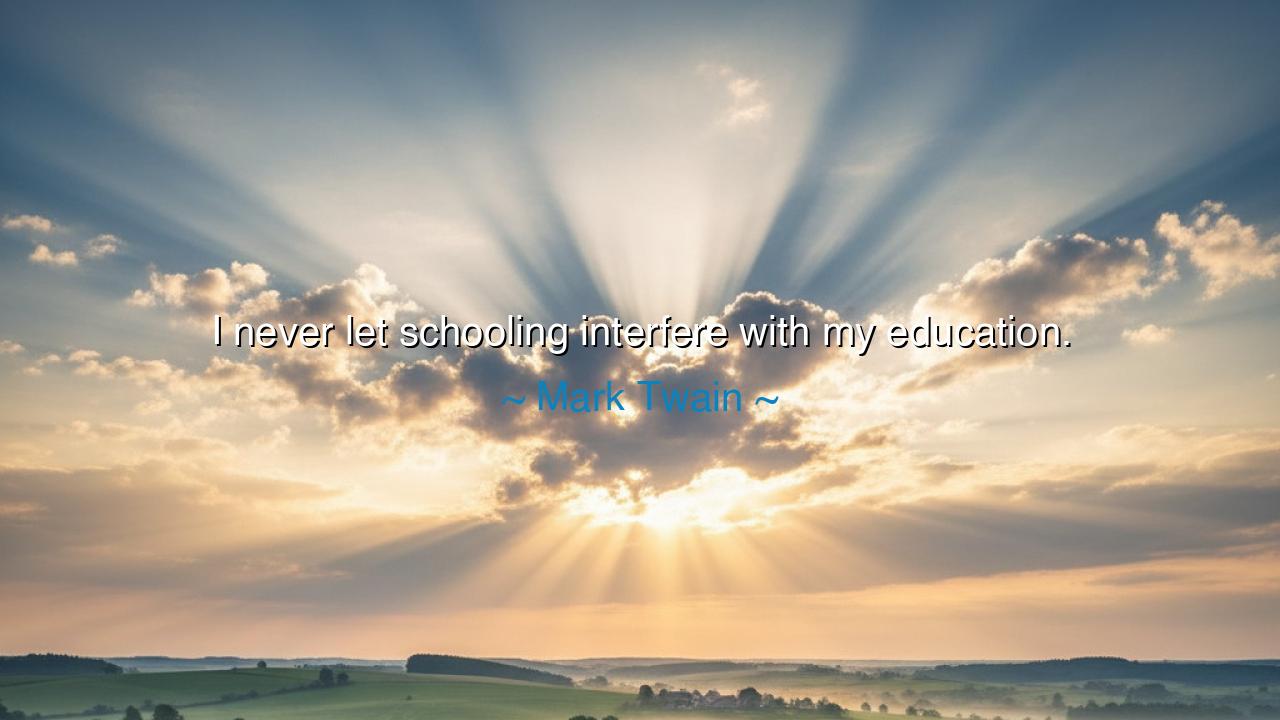
I never let schooling interfere with my education.






The great sage of the Mississippi, Mark Twain, once uttered a line that has echoed through the ages like a bell calling to freedom: “I never let schooling interfere with my education.” These words, simple yet thunderous, remind us that schooling and education are not the same thing. Schooling is the structure built by society—the walls, the rules, the lessons repeated in unison. But education is the fire that burns within the soul—the thirst for truth, the hunger to understand, the courage to question. Twain, with his wry humor and boundless curiosity, speaks not only to students in classrooms but to all who would seek wisdom beyond the limits of prescribed thought.
In his time, Twain saw the dawn of the industrial school—an age when young minds were trained as factory workers of the intellect, drilled in obedience and memorization. Yet he, a man of the river, a wanderer of words, knew that the heart of learning lies not in reciting facts, but in discovering meaning. True education cannot be confined within walls or measured by examinations; it grows wild in the open fields of experience, watered by curiosity and nourished by wonder. Thus Twain, with the courage of a rebel philosopher, declared his independence from the dull tyranny of mere schooling.
Consider the tale of Thomas Edison, that restless boy whom teachers dismissed as “addled,” too slow to follow the lessons. His mother, seeing what the system could not, took him from the classroom and taught him to love knowledge rather than fear it. That spark of curiosity—free from rigid schooling—became the light that illuminated the modern world. It was not the classroom that taught him to invent, but his own relentless questioning, his willingness to fail a thousand times in pursuit of truth. He lived Twain’s wisdom: that education belongs to those who seek it, not merely those who are given it.
History is filled with such souls—Leonardo da Vinci, who learned more from the flight of birds and the swirl of rivers than from any master; Abraham Lincoln, who read by firelight after long days of toil, teaching himself the law of nations and the poetry of justice. These men were not schooled into greatness; they educated themselves through struggle, through reflection, through living. Theirs was not the learning of the classroom but the learning of the world—the wisdom that cannot be graded, only earned.
Twain’s warning is not against teachers, but against blind obedience to systems that stifle the mind. When a young person is taught to value grades above growth, conformity above curiosity, they may pass through schooling untouched by education. They learn to remember, but not to think; to agree, but not to question. And so the fire of the mind dims, replaced by the cold ashes of compliance. It is this tragedy that Twain sought to prevent: that the divine spark of learning be smothered beneath the weight of standardized thought.
Let us then reclaim the ancient art of true education—to learn from the stars, from the silence, from failure, from friendship, from the turning of the earth. Let every person be both student and teacher, both seeker and sage. Read not only what is assigned, but what your soul demands. Listen not only to the voices of authority, but to the quiet truth within. For the greatest lessons are not written in books—they are lived, felt, and remembered in the heart.
And so, dear listener, let this be your creed: Be your own teacher. Question bravely, learn tirelessly, live curiously. Let schooling be your tool, but never your master. Seek wisdom in every place where life breathes—in conversation, in solitude, in failure, in joy. If you must choose between being well-schooled and being truly educated, choose always the latter, for schooling ends when the bell rings, but education is the journey of the eternal soul.
Thus spoke Twain, the eternal jester of truth: that to live wisely is to learn always, and to learn truly is to live freely. May his words kindle in you the sacred fire of curiosity—the flame that no institution can extinguish, the flame by which all true civilization is lit.






AAdministratorAdministrator
Welcome, honored guests. Please leave a comment, we will respond soon